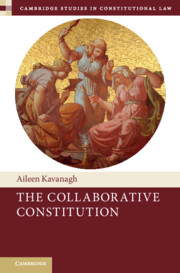Book contents
- The Collaborative Constitution
- Cambridge Studies in Constitutional Law
- The Collaborative Constitution
- Copyright page
- Brief Contents
- Contents
- Acknowledgements
- Abbreviations
- Introduction
- Part I Institutions and Interactions
- Part II Rights in Politics
- Part III Judge as Partner
- 7 Judge as Partner
- 8 The HRA as Partnership in Progress
- 9 Calibrated Constitutional Review
- 10 Courting Collaborative Constitutionalism
- Part IV Responsive Legislatures
- Bibliography
- Index
- Books in the series
8 - The HRA as Partnership in Progress
from Part III - Judge as Partner
Published online by Cambridge University Press: 12 October 2023
- The Collaborative Constitution
- Cambridge Studies in Constitutional Law
- The Collaborative Constitution
- Copyright page
- Brief Contents
- Contents
- Acknowledgements
- Abbreviations
- Introduction
- Part I Institutions and Interactions
- Part II Rights in Politics
- Part III Judge as Partner
- 7 Judge as Partner
- 8 The HRA as Partnership in Progress
- 9 Calibrated Constitutional Review
- 10 Courting Collaborative Constitutionalism
- Part IV Responsive Legislatures
- Bibliography
- Index
- Books in the series
Summary
This chapter traces judicial decision making under the Human Rights Act 1998, examining how courts approach their tasks of interpreting legislation compatibly with rights, on the one hand, or, if that is not possible, making a declaration of incompatibility instead. Though the declaration of incompatibility is not legally binding on the Government and Parliament, this chapter uncovers ’the hidden strengths of weak-form review’, highlighting the multiple ways in which declarations of incompatibility tie the hands of the political branches of government. It concludes that declarations of incompatibility are not aptly portrayed as opening gambits in a constitutional conversation, as dialogue scholars would lead us to believe. Instead, they are authoritative decisions in a collaborative constitutional scheme, where judicial determinations of the higher courts that legislation violates rights are entitled to constitutional comity and respect. It concludes by noting the current trend towards ’autochthonous constitutionalism’ under the common law, in preference to litigation under the HRA.
Keywords
- Type
- Chapter
- Information
- The Collaborative Constitution , pp. 230 - 265Publisher: Cambridge University PressPrint publication year: 2023

